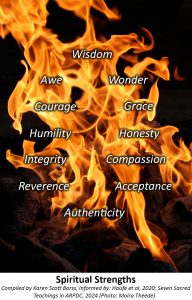6 Teachers
The inner journey, pursued faithfully and well,
always takes us back to the world of action.
But when we return to that world,
we find ourselves in a different place
than before we took the inner journey.
– Parker J. Palmer

This chapter focuses on the spiritual ‘teachers’ that we can continue to draw upon – and that we can become – as we move forward on our personal and/or professional path. Spiritual ‘teachers’ present themselves in a multitude of creative forms: our own inner resources and spiritual strengths that emerge as we learn to listen deeply for these gifts; material resources that arise out of many ways of knowing to inform our exploration; and human resources that come in the form of companions and mentors along the way (Barss, 2012a).
As we move toward the end of this handbook, particular emphasis is placed on identifying and accessing the kind of mentorship from ‘external teachers’ that you may wish to have as you continue on your spiritual or inner journey. An invitation is also offered to envision the kinds of mentorship and companionship you might feel called to offer, whether this be continuing in existing such roles and/or taking on new ones. The wish to do the latter often arises out of the renewed sense of meaning and purpose that can emerge from a cycle of spiritual searching. Whether giving and/or receiving spiritual mentorship, such soul-level companionship can deeply nourish our universal spiritual need for enriching and supportive interconnection with others.

